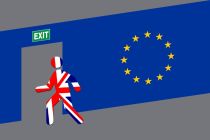It is too soon to say what will happen after Brexit and what dire consequences for  Britain and the European Union will result from this action, but the UK break away from its European partners will certainly have a negative economic outlook for both sides. Among other things, it will hamper the free movement of labor. Even if Britain manages to secure a deal where it keeps access to the single market, income per person will still fall. In addition, if the UK is unwilling to accept the free movement of labour, it is likely trade will fall considerably. For the rest of Europe, the most likely negative outcome will be evident when other European countries decide to follow Britain's example and when even others might decide to close their borders to stem the flow of immigration. Theresa May and other british leaders do not seem to be concerned.
Britain and the European Union will result from this action, but the UK break away from its European partners will certainly have a negative economic outlook for both sides. Among other things, it will hamper the free movement of labor. Even if Britain manages to secure a deal where it keeps access to the single market, income per person will still fall. In addition, if the UK is unwilling to accept the free movement of labour, it is likely trade will fall considerably. For the rest of Europe, the most likely negative outcome will be evident when other European countries decide to follow Britain's example and when even others might decide to close their borders to stem the flow of immigration. Theresa May and other british leaders do not seem to be concerned.
UNITED KINGDOM: Doing Brexit the hard way 
- Theresa May opts for a clean break with Europe. Negotiations will still be tricky
- Setting out her plans at last, the Prime Minister promises a “truly global Britain” outside the European Union. Is that plausible?
London, Jan. 21.─ It might be called May’s paradox. Since she became prime minister last July, Mrs May has been urged by businesses to clarify her Brexit goals. Yet every time she has tried, investors have reacted by selling sterling, because she has shown a preference for a “hard” (or, as her advisers prefer, “clean”) Brexit that takes Britain out of the EU’s single market and customs union.
In fact the pound rose on January 17th when she gave a speech that set out her most detailed thinking so far about Brexit. That was partly because her decision to leave the single market and customs union had been widely trailed, causing the pound to fall in the run-up to her speech.
But it may also have been because markets were pleasantly surprised by her language in setting out a dream of a liberal, open future for the country—she spoke behind the slogan “A Global Britain”—and her expressed wish for continuing friendly relations with Europe.
There is a liberal vision of a post-Brexit future in which Britain escapes the most protectionist features of the EU and opens its economy to the rest of the world. It is one that includes lower taxes, less pettifogging regulation and freer trade. During the referendum campaign it was sometimes talked of as “Singapore on steroids”: a dynamic, open Britain capable of competing not just with other EU countries but with the whole world.
The trouble is that, for all her pleasing rhetoric, Mrs May is not really pursuing this vision. She has set immigration control as her priority (see Bagehot), even though today’s service businesses depend on being able to move people around at short notice, as does high-tech industry. A similar drawback attaches to her insistence on escaping the jurisdiction of the European Court of Justice (ECJ) ...
[ Full text ]
Comments powered by CComment